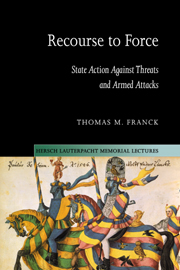Book contents
- Frontmatter
- Contents
- Acknowledgments
- 1 The United Nations' capacity for adapting to radical changes of circumstance
- 2 Use of force by the United Nations
- 3 The original parameters of self-defense
- 4 Self-defence against state-sponsored terrorists and infiltrators
- 5 Self-defense against ideological subversion
- 6 Self-defense against attacks on citizens abroad
- 7 Anticipatory self-defense
- 8 Countermeasures and self-help
- 9 The “purely humanitarian” intervention
- 10 What, eat the cabin boy? Uses of force that are illegal but justifiable
- Index
5 - Self-defense against ideological subversion
Published online by Cambridge University Press: 17 July 2009
- Frontmatter
- Contents
- Acknowledgments
- 1 The United Nations' capacity for adapting to radical changes of circumstance
- 2 Use of force by the United Nations
- 3 The original parameters of self-defense
- 4 Self-defence against state-sponsored terrorists and infiltrators
- 5 Self-defense against ideological subversion
- 6 Self-defense against attacks on citizens abroad
- 7 Anticipatory self-defense
- 8 Countermeasures and self-help
- 9 The “purely humanitarian” intervention
- 10 What, eat the cabin boy? Uses of force that are illegal but justifiable
- Index
Summary
In chapter 4 we examined the legality of states' use of force to pursue transnational insurgents or terrorists to their bases in neighboring states. We saw instances in which this recourse to force was justified successfully as “self-defence” within the meaning of the Charter's Article 51. We turn now to a related justification: the claim of a state to use force in collective self-defense against another kind of indirect aggression, namely, the export of “ideological subversion.” By this has been meant the sort of encouragement given by communist states to peoples' liberation movements and by Western states to democratic resistance behind the Iron Curtain. Although the phenomenon rarely implicated outright military subversion of a government, it had important geopolitical ramifications during the Cold War, when any overturning of a government aligned with either the USSR or the US was seen to have direct strategic consequences for the balance of power. In that confrontational era, each side claimed that any ideological realignment of one of their clients, even if brought about by purely domestic events, must have been inspired by, and thus was attributable to, the other side, therefore giving rise to the right to use force as appropriate countermeasure in “collective self-defence.”
The response of states and international institutions to this justification has been entirely and resoundingly negative. However, the same justification is recently beginning to be heard again, this time in the theological–ideological conflict between forces of Islamic fundamentalism and more tolerant societies, including other more liberal Islamic states, secular India, and the Western societies in which religions have been disestablished.
- Type
- Chapter
- Information
- Recourse to ForceState Action against Threats and Armed Attacks, pp. 69 - 75Publisher: Cambridge University PressPrint publication year: 2002



